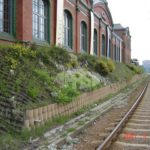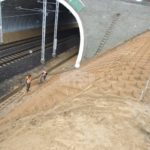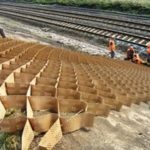Integrated Railway Track Stabilization and Support with Neoloy® Geocells
Neoloy Geocells give engineers a single soil stabilization strategy for an entire railway infrastructure project and more
Neoloy Geocells give engineers a single soil railway track stabilization strategy for an entire railway infrastructure project. In addition to load support, Neoloy provides integrated railway track stabilization and slope/channel protection for the embankments, retaining walls, flyovers, and stream diversions typical of the railway development projects.
- Elevated Line Slope Protection – Neoloy provides long-term erosion protection for all types of rail embankments. Used with topsoil and vegetative cover for green landscapes, Neoloy Geocells provide effective protection, confinement and soil stabilization.
- Earth Retention Railway Abutments – Neoloy offers cost-effective mechanically stabilized earth structures for retention walls due to steep slopes, sharp grade changes, irregular topography, or lack of land on a right of way that abut the rail line.
- Earth Berms & Green Noise Barriers – Earth is one of the best insulators against noise. Neoloy earth structures provide the excellent sound attenuation, minimize maintenance, and provide a green aesthetic face to surrounding communities. Earth berms provide better noise barriers and are more cost efficient. However, Neoloy retention walls where grade changes are sharp offer excellent acoustic barriers, a green face, and are more durable than concrete alternatives.
Examples of Earth Stabilization Solutions for Rail Right of Ways
Benefits
- Effective noise abatement and acoustic barrier
- Efficient drainage and stormwater management
- Seismic resistance
- Low cost, fast, all weather installation
- Cost effective particular when compared to stone and concrete alternatives
- Low maintenance and Total Cost of Ownership
- Green wall with vegetated fascia on the outer rows for a soft, green and aesthetic retention solution
- Use of local granular material for structural infill
- Serves as planters to protect young plants and encourage vegetative growth
- High stiffness and strength with very low creep
- Dimensionally stable for reliable confinement in a wide temperature range
- Resistant to stress-cracking, particularly at temperature extremes
- Very resistant to additive leaching, oxidation and photochemical degradation




